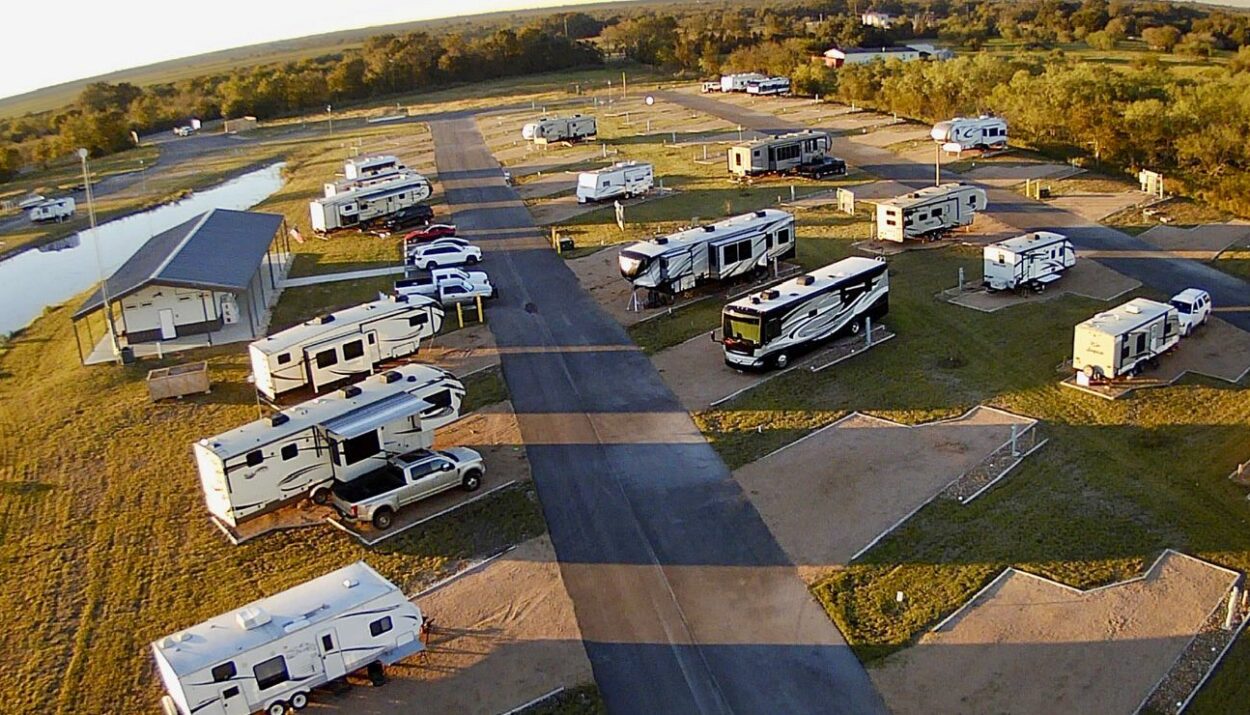With a booming tourism industry, a large RV market, and a favorable climate, the Lone Star State offers a promising opportunity for entrepreneurs. In Texas, the dreams of entrepreneurs are as limitless as the state itself, providing a fertile ground for those ready to tap into the growing demand for RV parks and embrace the adventure that comes with it.
But before hitting the road, it’s important to understand the legal requirements, choose the right location, calculate start-up costs, and develop a solid marketing strategy.
This article will guide you through the essential steps of starting, managing, and maintaining an RV park in Texas, helping you turn your Texas-sized dreams into a successful reality.
Why Start an RV Park in Texas?
Texas, known for its warm hospitality and rich cultural tapestry, presents great opportunities for entrepreneurs seeking to carve their niche in the booming tourism industry. Setting up an RV park in the Lone Star State not only allows you to cater to the ever-growing number of travelers exploring the state but also provides a gateway to forging meaningful connections with guests from all walks of life.
The sprawling landscapes, charming small towns, and iconic attractions make Texas a prime location for those looking to create a unique and memorable experience for visitors.
Booming Tourism Industry
Texas boasts a booming tourism industry, offering vast opportunities for ventures in the realm of adventure, travel, and business within its diverse and captivating landscape.
With its stunning natural beauty, vibrant cities, and rich cultural heritage, Texas has become a top destination for travelers seeking a mix of relaxation and excitement. The state’s unique blend of attractions, from the historic Alamo in San Antonio to the vibrant music scene in Austin, provides a diverse range of experiences for visitors.
The increasing popularity of RV travel has opened up new possibilities for entrepreneurs looking to invest in the hospitality sector. The idea of establishing RV parks in strategic locations across Texas is not only lucrative but also aligns perfectly with the state’s emphasis on outdoor adventures and exploration.
Large RV Market
The Lone Star State hosts a large RV market, making it an ideal investment destination for budding entrepreneurs looking to establish a successful business within the RV park industry.
Texas has been at the forefront of the rise in RV ownership in the United States, becoming the number one destination for RV shipments. This has created a growing demand for park development, creating numerous opportunities for investors to capitalize on this booming industry.
The promising investment prospects within Texas attract those seeking a lucrative venture in a state known for its warm hospitality and entrepreneurial spirit.
Favorable Climate
Texas offers a favorable climate for outdoor recreation, making it an attractive destination for families seeking a friendly and inviting environment for their RV park adventures.
The abundance of sunshine in Texas provides ample opportunities for families to engage in a wide array of activities like hiking, biking, fishing, and picnicking. With its vast landscapes and diverse terrain, Texas is a paradise for outdoor enthusiasts.
The family-friendly atmosphere in Texas is enhanced by the numerous recreational facilities that cater to all ages, ensuring that everyone can find something enjoyable to do. RV park visitors can revel in the serene natural beauty while immersing themselves in the warm and welcoming Texan hospitality.
What are the Legal Requirements for Starting an RV Park in Texas?
Before embarking on your RV park venture in Texas, it’s crucial to understand the legal framework governing the establishment, operation, and compliance requirements in the state.
Zoning and Permits
Navigating the zoning regulations and permit processes is a critical aspect of RV park development, ensuring compliance and adherence to the legal frameworks governing land use and development.
Understanding the specific requirements set forth by Texas state regulations is essential for those looking to establish an RV park. The process typically involves obtaining various permits, such as building permits, water and sewer permits, and health department approvals.
Texas zoning laws dictate where RV parks can be located and what type of infrastructure is required. Each county may have its own set of regulations, so it’s important to conduct thorough research and engage with local authorities for guidance on land development. Meeting all these requirements is crucial for a successful RV park establishment in Texas.
Health and Safety Regulations
Prioritizing health and safety regulations in your RV park operations is paramount to ensuring a secure and enjoyable experience for visitors in the Lone Star State of Texas.
By upholding stringent health and safety protocols, such as regular sanitation of common areas, ensuring proper waste disposal, and conducting routine safety checks on amenities like electrical hookups and water connections, RV park managers can create a welcoming environment that promotes the overall well-being of guests.
Providing easy access to emergency services, clear signage for navigational aid, and interactive orientations on park rules further enhances visitor safety and service quality. Such proactive measures not only safeguard visitors but also contribute to a positive reputation that attracts new guests seeking a safe and comfortable RV park experience.
Water and Sewage Requirements
Meeting water and sewage requirements is essential for providing top-notch amenities and accommodations at your RV park, ensuring a comfortable and convenient stay for guests exploring the wonders of Texas.
By investing in proper infrastructure development to meet these requirements, you not only enhance the overall experience of your visitors but also ensure a sustainable and eco-friendly operation.
Access to clean water, efficient waste management, and well-maintained sewage systems are crucial aspects that can set your RV park apart in terms of guest services. These amenities contribute significantly to the comfort and satisfaction of travelers, making your park a sought-after destination for those seeking a hassle-free and enjoyable stay.
How to Choose the Right Location for Your RV Park in Texas?
Selecting the perfect location for your RV park in Texas involves strategic considerations such as accessibility, amenities, and the overall appeal to travelers seeking a memorable Lone Star State experience.
Proximity to Tourist Attractions
Choosing a location near prominent tourist attractions in Texas enhances the appeal of your RV park site, offering guests an immersive experience of the rich culture and hospitality of the Lone Star State.
Being close to tourist hotspots like the historic Alamo in San Antonio or the vibrant music scene in Austin allows visitors to easily explore these iconic destinations. Strategically selecting a site near these attractions not only attracts more guests but also provides them with convenient access to the best that Texas has to offer.
Incorporating elements of Texas culture, such as local cuisine and music, into the park’s ambiance can further enhance guests’ overall experience and create lasting memories of their trip.
Accessibility and Visibility
Ensuring easy accessibility and high visibility for your RV park location in Texas is pivotal for attracting guests and implementing effective marketing and promotional campaigns to drive business growth.
This can be achieved by selecting a location with good road infrastructure, close proximity to major highways, and clear signage directing visitors to your park.
Leveraging digital marketing strategies such as search engine optimization (SEO), social media advertising, and online travel platforms can increase your park’s visibility and reach a larger audience.
Promotional tactics like offering discounts, hosting events, and partnering with local tourist attractions can also boost awareness and attract more guests to your RV park.
By focusing on accessibility and visibility, you can enhance the overall success of your RV park in Texas.
Availability of Amenities
The availability of essential amenities at your chosen RV park location in Texas is crucial for ensuring guest satisfaction, efficient park management, and the delivery of exceptional services that elevate the overall visitor experience.
These amenities play a key role in creating a comfortable and enjoyable environment for guests, allowing them to relax and unwind during their stay. From well-maintained shower facilities and clean restrooms to reliable electrical hookups and convenient waste disposal services, providing a range of amenities enhances the convenience and comfort of guests.
Amenities such as laundry facilities, recreational areas, and WiFi connectivity contribute to the overall satisfaction of visitors, making their stay more memorable and enjoyable. Focusing on facility management and service quality allows RV parks in Texas to ensure high levels of customer satisfaction and loyalty.
What are the Start-up Costs for an RV Park in Texas?
Embarking on the establishment of an RV park in Texas entails initial start-up costs encompassing investments, budgeting considerations, capital requirements, and potential financing avenues.
When evaluating the financial aspects of starting an RV park, it’s crucial to allocate funds for land acquisition, infrastructure development, utility connections, permits, and operational expenses. Planning a detailed budget that outlines these expenses will help you gauge the total investment needed.
To meet these capital requirements, aspiring RV park owners often explore different financing options such as bank loans, SBA loans, private investors, or crowdfunding. Each financing avenue has its own set of criteria and considerations, so conducting thorough research and seeking professional financial guidance is essential to secure the necessary funding for your venture.
Land and Property Expenses
Allocating resources for land and property expenses represents a significant portion of the start-up costs for an RV park in Texas, where real estate app development plays a pivotal role in shaping the park’s foundation. Real estate investments are crucial for acquiring the right parcel of land, considering factors such as location, accessibility, and potential for growth.
Property expenses like property taxes, insurance, maintenance, and operational costs must also be factored in to ensure the financial sustainability of the RV park in the long run.
Development and Renovation Costs
Budgeting for construction and renovation costs is essential when initiating an RV park in Texas, ensuring that equipment procurement, facility improvements, and maintenance activities are adequately financed to create a welcoming environment for guests.
Development costs encompass a range of expenses, including site preparation, utility installations, landscaping, and infrastructure development. For a successful RV park start-up, entrepreneurs need to carefully plan their financial outlay. Equipment needs, such as RV hookups, dump stations, and utility pedestals, are critical components that demand a significant portion of the budget.
To enhance the guest experience, allocating funds for improvement initiatives such as recreational facilities, picnic areas, and common areas can set your park apart. Ongoing maintenance budgeting is also crucial to ensure the park remains in top condition and meets guest expectations.
Equipment and Operational Costs
Anticipating equipment and operational costs is vital for the financial sustainability and profitability of your RV park venture in Texas, as efficient operations directly impact revenue generation and long-term success in the industry.
Having a clear understanding of the equipment needed for your RV park, as well as the associated costs, allows for effective budgeting and resource allocation.
Tightly managing operational expenses, such as utilities, maintenance, and staff wages, is essential to ensure cost control and maximize profitability.
Marketing and Advertising Your RV Park in Texas
Elevate the visibility and appeal of your RV park in the Lone Star State by implementing robust marketing and advertising strategies that encompass effective promotion, strategic management, and unparalleled customer service to attract and retain guests.
High-Quality Website
In today’s digital age, having a high-quality website for your RV park is not just an option; it’s a necessity. A well-designed website serves as your online storefront, offering potential visitors their first glimpse into what your park has to offer.
Your website should be user-friendly, visually appealing, and mobile-responsive, providing essential information like amenities, booking options, and contact details. An effective website enhances your credibility and can significantly increase bookings by making it easy for customers to find and engage with your park.
Roverpass has developed a Premium Website Builder to assist RV parks in enhancing their online presence. This tool enables the creation of superior websites that not only draw in more guests but also boost income. With a dedicated team specializing in content creation, design, and development, we’ll craft a distinctive website that distinguishes you from your rivals.
Moreover, integrating your website with our campground reservation system allows for a seamless and efficient method to offer your services around the clock.
Social Media and Customer Service
Alongside a robust website, a social media marketing strategy plays a pivotal role in promoting your RV park. Social media platforms are powerful tools for building a community around your brand, engaging with customers, and showcasing the unique experiences your park offers.
Regularly updating your social media with high-quality content, engaging stories, and interactive posts can drive awareness, foster a loyal customer base, and ultimately, increase occupancy rates.
Finally, emphasizing strong customer service standards not only leads to positive guest experiences but also encourages repeat visits and referrals, ultimately fostering a loyal customer base. A well-rounded marketing approach combined with exceptional customer service can set your RV park apart in a competitive market like Texas.
Partnering with Local Businesses
Forging strategic partnerships with local businesses in Texas can amplify the promotional efforts of your RV park, facilitating networking opportunities and aligning with the rich cultural tapestry of the Lone Star State.
By collaborating with nearby enterprises, RV parks can tap into a pool of resources and expertise that would otherwise be challenging to access independently. Leveraging the local network not only expands outreach but also fosters a sense of community among businesses sharing a common goal.
Integrating elements of Texas culture into marketing initiatives adds a unique and authentic touch, resonating with visitors seeking an immersive experience. This approach not only boosts brand visibility but also contributes to supporting the regional economy and building lasting relationships within the industry.
Attending RV Shows and Events
Participating in RV shows and events offers a prime platform to showcase your park’s hospitality services, engage with potential guests, and network with industry peers to bolster the presence and reputation of your RV venture in Texas.
By actively participating in these exhibitions, you not only get the chance to highlight the unique amenities and services your park offers but also connect with a diverse audience interested in RV travel. Interacting with attendees allows for real-time feedback on your offerings, enabling you to tailor your services to meet customer preferences.
These events provide an invaluable opportunity to forge partnerships and collaborations within the vibrant hospitality sector, opening doors to new marketing avenues and potential business growth.
Managing and Maintaining Your RV Park in Texas
Efficiently managing and maintaining your RV park operations in Texas is essential for ensuring sustainability, environmental impact mitigation, and the delivery of exceptional guest experiences that drive long-term success and profitability.
Implementing effective operational strategies plays a crucial role in optimizing resources and enhancing overall operational efficiency. Regular maintenance protocols are key to upholding the quality of facilities and infrastructure within the park, ensuring a safe and enjoyable environment for guests.
Incorporating sustainability initiatives such as water and energy conservation practices not only aligns with environmental stewardship goals but also helps in reducing operational costs over time. By integrating these practices, RV park owners can create a well-rounded approach that benefits both the business and the environment.
Hiring Staff and Management
Recruiting capable staff members and implementing effective management structures are integral to delivering exceptional customer service and ensuring guest satisfaction at your RV park in Texas.
By fostering a team of dedicated and well-trained employees, your RV park can create a welcoming and efficient environment for guests, enhancing their overall experience. Engaging with staff through regular training sessions, mentor mentee matching software and feedback mechanisms not only boosts morale but also improves service standards.
When employees feel valued and supported, they are more likely to go above and beyond to meet guest needs and exceed expectations. This level of employee engagement ultimately translates into higher levels of customer satisfaction, repeat business, and positive word-of-mouth referrals within the RV park community.
Maintaining Amenities and Facilities
Continuous improvement and maintenance of amenities and facilities at your RV park in Texas are essential for garnering positive reviews, feedback, and enhancing the overall guest experience to drive business growth and reputation.
One key aspect of amenity maintenance in RV parks is the integration of guest feedback into operational procedures. By actively seeking and incorporating feedback from guests, you can identify areas for improvement and address any issues promptly, demonstrating your commitment to guest satisfaction.
Effective review management plays a crucial role in shaping the perception of your park. Responding to reviews, both positive and negative, shows that you value guest input and are dedicated to providing a top-notch experience. This feedback loop allows for continuous enhancements to facilities, ensuring that your RV park remains a desirable destination for travelers.
Dealing with Seasonal Changes
Adapting to seasonal changes poses operational challenges for RV park owners in Texas, yet presents opportunities to optimize revenue streams, outshine competition, and navigate industry trends effectively for sustained success.
Seasonal variations in Texas can greatly impact the revenue of RV park operations, as the number of visitors fluctuates throughout the year. During peak seasons, such as summer and holidays, parks may experience a surge in demand, leading to increased profits. In off-peak times, management must find innovative ways to attract guests and generate income.
This dynamic environment requires owners to closely monitor competitor strategies and industry trends to stay ahead in the market.
Frequently Asked Questions
What is the first step in starting an RV park in Texas?
The first step in starting an RV park in Texas is to conduct thorough market research. This will help you understand the demand for RV parks in the area, the competition, and any specific regulations or requirements in the state.
Do I need any special permits or licenses to operate an RV park in Texas?
Yes, you will need to obtain a license from the Texas Department of Licensing and Regulation. Depending on the specific location of your RV park, you may also need to obtain additional permits from the local government.
What are some key factors to consider when choosing a location for an RV park in Texas?
Some important factors to consider when choosing a location for an RV park in Texas include the availability of utilities, proximity to major highways or tourist attractions, and the potential for future growth in the area.
How much does it typically cost to start an RV park in Texas?
The cost of starting an RV park in Texas can vary greatly depending on factors such as location, size, and amenities. On average, however, it can cost from $180,000 to more than $1,000,000.
What are some popular amenities to include in an RV park in Texas?
Some popular amenities to include in an RV park in Texas are full hookup RV sites, laundry facilities, picnic areas, and recreational activities such as swimming pools, playgrounds, dog runs, or hiking trails. It’s important to cater to the needs and interests of your target market.
Are there any tax incentives or benefits for starting an RV park in Texas?
Yes, there are some tax incentives and benefits available for starting an RV park in Texas. These can include property tax abatements and tax credits for creating jobs in certain areas. It’s best to consult with a tax professional for specific information and eligibility requirements.
For more insights on how to thrive in the RV park industry, keep reading our blog.






